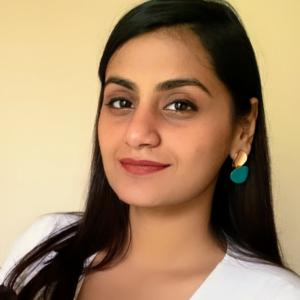Journalist Ruth Kutemba ventured into journalism in 2017 when she was a student at the University of Lubumbashi in her native Democratic Republic of the Congo (DRC). Her first step was to join a group of talented young journalists at the university's radio station.
“People told me that I have a very beautiful voice. I was even nicknamed “Ruth RFI” because people said it sounds like I am on Radio France Internationale,” she said.
Kutemba also worked on the magazine, "Phoenix 40" while in school, where she narrated stories about women and amplified underrepresented voices for a section called "In the Skin of a Woman."
Upon graduating in 2019, she became a reporter and producer for Héritage TV. She has also worked with Congo Check, Habari DRC and Global Infos, where she manages the "Desk Femme" section.
Being a journalist in the DRC is not an easy career path. Restrictions on media are widespread, and financial uncertainty is high. Journalists in the country have been detained for their investigations, and charged with spreading “fake news.” A 2022 report by the U.S. Department of State found that self-censorship among journalists is also common.
Kutemba is a member of ICFJ’s French-language Crisis Reporting Forum, and has written for IJNet French. I spoke to her about her experience reporting in the DRC, how she has benefited from IJNet and the Forum, and more:
What initially drew you to journalism?
Since I was little, I dreamed of doing this job; many tell me that my gift is innate, and I was created to be a journalist. First of all, it's passion because I don’t earn much. If it wasn't for the passion, I would have given up. I draw inspiration from Dominique Tchimbakala, a journalist with TV5 Monde, who, as one of the elders in the field, motivated me to follow this path.
Many discouraged me, saying that I'm not going to [earn] anything, that journalists don't have any money. [But] I am always optimistic. Money comes after work. When people say, "Ruth, thanks to you, I got into journalism. You are my source of inspiration," it motivates me.
It's a noble profession that I do not regret having chosen.
What has your experience been like as a woman in journalism?
I remember being contacted by Global Infos, an online media outlet that needed a female journalist responsible for the “Desk Femme” section. I was able to land this opportunity because they needed a female journalist.
[I’m also] a member of the WanaData community, a pan-African network of women data journalists based in Senegal.
How have technological developments affected how you interact with your audience?
It is true that our profession evolves [with] technological progress, and [currently] there is a disruption in the way information is consumed by the public.
We have to adapt to meet the needs of society. We offer content that affects the social life of the population, and beyond TV, we broadcast it online. Several radio and television channels have understood this; most have YouTube channels, sites, pages, and Facebook accounts to reach a large part of the population here in the DRC.
Journalists must also be trained in fact-checking because with technological progress a lot of false information is shared. A bitter observation is that even journalists fall into this trap in search of scoops, and this is a danger.
Are there any stories of yours that you’re particularly proud of?
Once, I produced a report on the lack of electricity in a district of the city of Lubumbashi. After my report, the neighborhood was electrified. When the residents meet me, they tell me how happy they are because I provided a solution to their problem.
I also did a report on a woman who gave birth to triplets. She and her husband had no money, but thanks to my report, they were able to get help. My reporting had a tangible effect on the local community and was able to bring about significant change.
What are your main concerns as a journalist in the DRC?
In the DRC, the safety of journalists is not really guaranteed, especially [when conducting investigations] on sensitive subjects like mines. Some of our colleagues have lost their lives. The advice my elders always give me is that; a good journalist is one who is alive.
My career is only [about] 10 years old. I always try to refer to a code of conduct and ethics as a Congolese journalist in order to do my job correctly. I also understand that press freedom is restricted by media partnerships with government institutions. Financial independence for journalists is important to enjoying press freedom.
How have you benefited from the ICFJ Crisis Reporting Forum and IJNet?
The Forum strengthened my capacity and equipped me through participation in various webinars. One of these webinars was about how to increase one's chances of being hired as a journalist. Among the tips shared at the event, the panelist suggested among other things, to specialize in order to stand out from the crowd.
I took the advice given by the panelist and specialized in women's issues which led me to get a job at Global Infos, where I’m in charge of the Women's Desk. If it weren't for the tips shared during this webinar from the Forum, I would never have come across this opportunity. The Forum has trained me, continues to train me, and I continue to learn. I’m proud to be a member of the ICFJ French Forum.
Driven by my desire to demystify misinformation, I wrote an article for IJNet, which led to my recruitment by the online fact-checking platform, Congo Check. In my article, I interviewed one of the [outlet’s] managers, and after the publication I shared the link with him. That's how I joined this media outlet. I had never had this opportunity until IJNet offered the chance to write this article on tips for combating misinformation in conflict zones.
Photo courtesy of Ruth Kutemba.
This interview has been edited for clarity and length.


